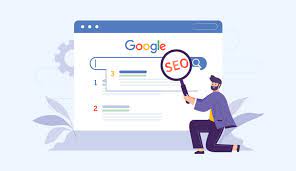SEO (Search Engine Optimization) is the practice of optimizing a website or webpage to increase the quantity and quality of its traffic from a search engines organic results.

The benefits are obvious: free, passive traffic to your website, month after month.
But how do you optimize your content for SEO, and what “ranking factors†actually matter?
To answer that, we first need to understand how search engines work.
How search engines work
Search engines are like libraries for the digital age.
Instead of storing copies of books, they store copies of web pages.
When you type a query into a search engine, it looks through all the pages in its index and tries to return the most relevant results.
To do this, it uses a computer program called an algorithm.
Nobody knows exactly how these algorithms work, but we do have clues, at least from Google.
Heres what they say on their “How search works†page:
To give you the most useful information, Search algorithms look at many factors, including the words of your query, relevance and usability of pages, expertise of sources and your location and settings. The weight applied to each factor varies depending on the nature of your query – for example, the freshness of the content plays a bigger role in answering queries about current news topics than it does about dictionary definitions.
Speaking of Google, this is the search engine most of us use—at least for web searches. Thats because it has the most reliable algorithm by far.
That said, there are tons of other search engines you can optimize for.
Learn more about this in our guide to how search engines work.
How SEO works
In simple terms, SEO works by demonstrating to search engines that your content is the best result for the topic at hand.
This is because all search engines have the same goal: To show the best, most relevant results to their users.
Precisely how you do this depends on the search engine youre optimizing for.
If you want more organic traffic to your web pages, then you need to understand and cater to Googles algorithm. If you want more video views, then its all about YouTubes algorithm.
Since each search engine has a different ranking algorithm, itd be impossible to cover them all in this guide.
So, going forward, well focus on how to rank in the biggest search engine of them all: Google.
Google has a market share of ~92%. Thats why it pays to optimize your website for Google instead of Bing, DuckDuckGo, or any other web search engine.
How to optimize for Google
Google famously uses more than 200 ranking factors.
There was even talk way back in 2010 that there could be up to 10,000.
Nobody knows what all of these ranking factors are, but we do know some of them.
How? Because Google told us, and many people—including us—have studied the correlations between various factors and Google rankings.
Well discuss some of those shortly. But first, an important point:
Google ranks web pages, not web sites.
Just because your business makes stained glass windows doesnt mean that every page on your site should rank for the query, “stained glass windows.â€
You can rank for different keywords and topics with different pages.
Now lets talk about some of the things that affect rankings and search engine visibility.
Crawlability
Before Google can even consider ranking your content, it first needs to know that it exists.
Google uses several ways to discover new content on the web, but the primary method is crawling. To put it simply, crawling is where Google follows links on the pages they already know about to those they havent seen before.
To do this, they use a computer program called a spider.
Lets say that your homepage has a backlink from a website thats already in Googles index.
Next time they crawl that site, theyll follow that link to discover your websites homepage and likely add it to their index.
From there, theyll crawl the links on your homepage to find other pages on your site.
That said, some things can block Googles crawlers:
If youre concerned about any of these issues on your site, consider running an SEO audit with a tool like Connekt Teacher Site Audit.
Mobile-friendliness
63% of Google searches come from mobile devices, and that number is growing every year.
Given that statistic, it probably comes as no surprise that in 2016, Google announced a ranking boost for mobile-friendly websites in its mobile search results.
Google also shifted to mobile-first indexing in 2018, meaning that they now use the mobile version of your page for indexing and ranking.
In other words, most people will likely hit the back button when a desktop version of a site loads on mobile.
Thats important because Google wants to keep its users satisfied. Pages that arent optimized for mobile lead to dissatisfaction. And even if you do rank and win the click, most people wont stick around to consume your content.
You can check if your web pages are mobile-friendly with Googles mobile-friendly testing tool.
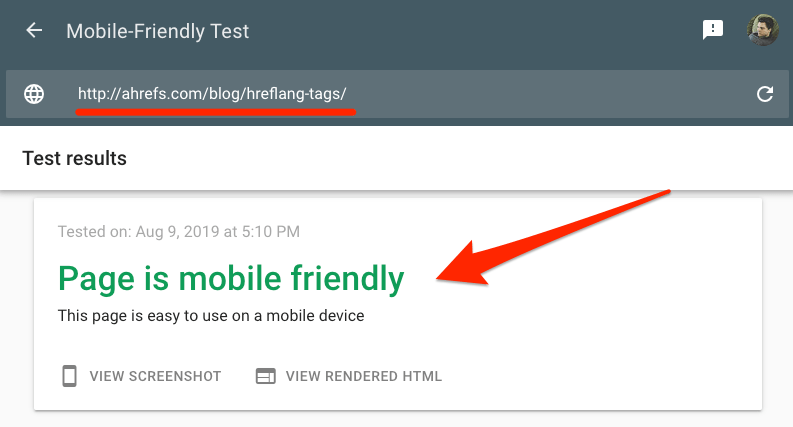
If they arent, hire a developer to fix them.
Pagespeed
Pagespeed is how fast your page loads. Its a ranking factor on desktop and mobile.
Why? Once again, Google wants to keep its users satisfied. If their users are clicking on search results that take too long to load, that leads to dissatisfaction.
To check the speed of your web pages, use Googles Pagespeed Insights tool.
Alternatively, use Connekt Teacher Site Audit to check for slow-loading pages across your site.
Just head to the “Performance†report and look for the “Slow page†warning.

Search intent
Finding a keyword or keywords that you want to rank for is easy. Just paste a topic into a keyword research tool like Connekt Teacher Keywords Explorer, then look for relevant keyword ideas with search volume.
That said, what many people fail to consider is whether their page aligns with their chosen keywords search intent.
To demonstrate search intent, lets look at an example.
Here are the current Google search results for the query “slow cooker recipesâ€:
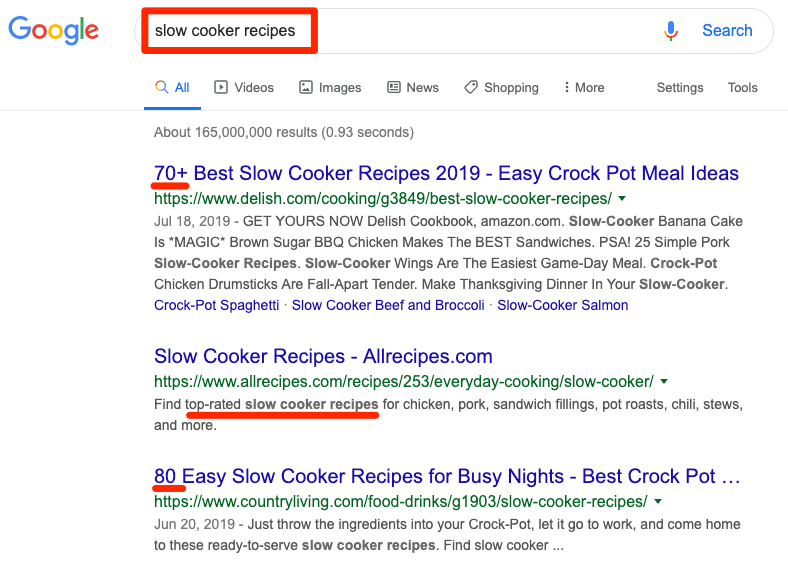
Compare those with the results for the query “slow cookerâ€:
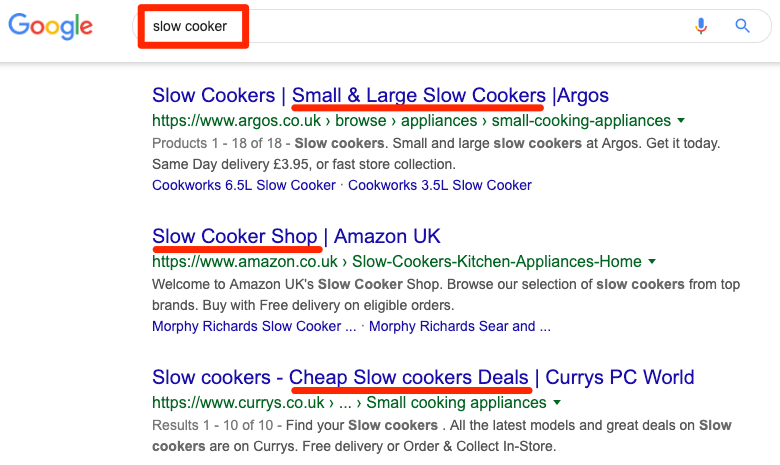
Despite the similarity between the two keywords, Google shows two completely different sets of search results. For “slow cooker recipes,†they show pages listing lots of recipes. For “slow cooker,†they show product listings and ecommerce category pages.
Google is interpreting the motive behind the query and showing results the user wants to see.
This is search intent in action.
How do you optimize for this?
Look at the top-ranking pages and ask yourself questions to identify the “3 Cs of search intent.â€
- Content type: Are most of the results blog posts, product pages, category pages, landing pages, or something else?
- Content format: Is Google mainly ranking how-to guides, list-style Videos, tutorials, comparisons, opinion pieces, or something entirely different? (Note. This one applies mainly to informational topics.)
- Content angle: Is there a common theme or unique selling point across the top-ranking pages? If so, this gives you some insight into what might be important to searchers.
Beyond this, you can also check for the presence (or not) of SERP features to infer intent.
For example, if theres a featured snippet in the results, then this may indicate that the searcher is looking for information.

If youre doing keyword research, you can filter for keywords with or without specific SERP features in Connekt Teacher Keywords Explorer.

Recommended reading: What is Search Intent? A Complete Guide for Beginners
Backlinks
Googles ranking algorithm is based on something called PageRank.
In simple terms, this interprets backlinks as votes. Generally speaking, pages with more votes tend to rank higher.
How do we know? Last year, we studied almost one billion web pages and found a clear correlation between referring domains (links from unique websites) and organic search traffic.

Long story short, backlinks matter if you want to rank for anything worthwhile.
The problem is that links can be challenging to build, especially to certain types of content like product pages.
There are tons of link building tactics but if youre new to the game, aim to build links to your best informational content (e.g., a blog post or a free tool).
Heres one way to do that:
Search for your target keyword on Google. Look for pages that arent as good as yours. Paste the URL of that page into our free backlink checker to see its top 100 links.
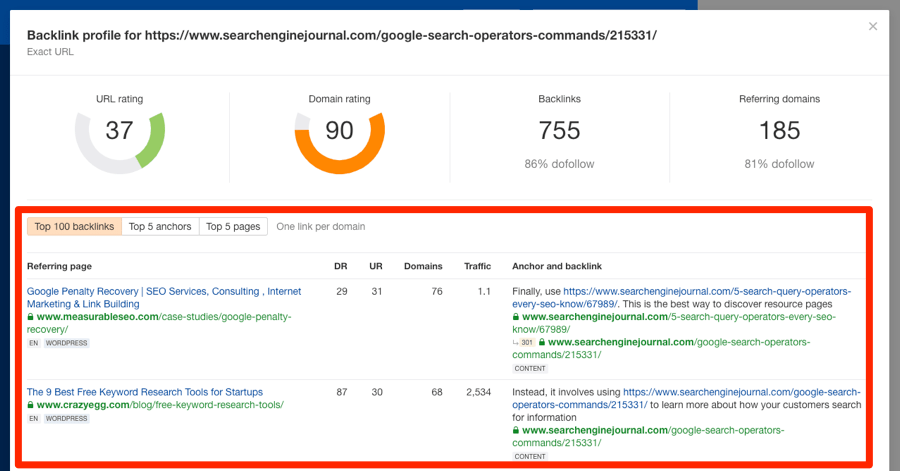
Consider reaching out to these people, explaining why your content is better, and ask if theyd swap out the link for yours.
This tactic is commonly known as the Skyscraper Technique.
Learn more about this technique, and other backlink building tactics, in the Videos and videos below.
Authority
Not all backlinks are created equal. Some carry more weight than others.
This fact is built-in to the way PageRank works.

Generally speaking, backlinks from high-authority pages are stronger than those from low-authority pages.
Unfortunately, Google discontinued public PageRank scores in 2016. That means theres no longer any way to see how much “authority†a web page has in Googles eyes.
Luckily, there are similar metrics around, one of which is Connekt Teacher URL Rating (UR).
URL Rating runs on a scale from 0–100 and takes into account both the quantity and quality of backlinks to a web page.
When we studied the relationship between UR and organic search traffic, we found a clear positive correlation.

For that reason, when building backlinks to your content, you should prioritize the building of links from strong pages over weak ones.
If youre analyzing competing pages for backlink opportunities in Connekt Teacher Site Explorer, the best way to do this is to look at the UR column in the “Backlinks†report.
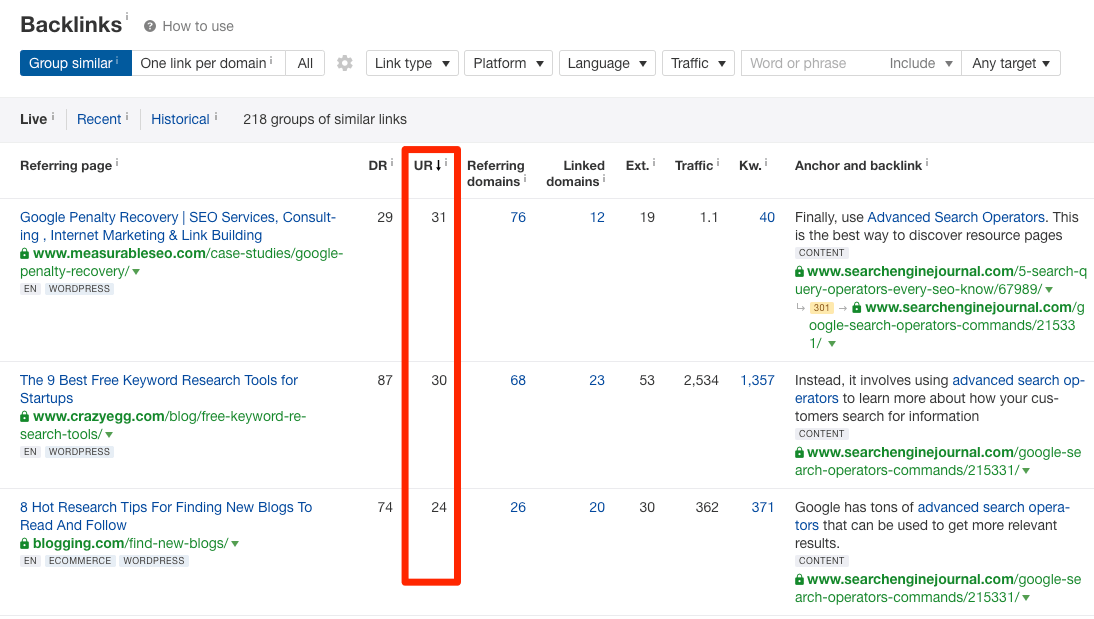
Of course, backlinks arent the only way to boost the “authority†of a web page.
URL Rating (UR) also takes into account internal links, meaning that links from other pages on your site contribute to the authority of a page.
If you want to boost the “authority†of a particular page and are struggling to build backlinks to it, consider adding some relevant internal links from other high-authority pages.
To see your most authoritative pages, check the “Best by Links†report in Connekt Teacher Site Explorer.

The golden rule here is not to shoehorn links where they dont belong. Always link contextually.
This tactic offers a good way to boost the “authority†of pages with commercial value like product pages. Youll often struggle to build backlinks to those pages directly.
Content quality
Google wants to rank the most reliable and useful results—always.
To do this, they look at content-related signals like expertise, authoritativeness, and trustworthiness.
Collectively, these are known as EAT.
(Learn more about EAT in Googles Search Quality Rater Guidelines.)
Other things you can do to increase the perceived quality of your content might be:
Generally speaking, the more accessible your content is to the majority of searchers, the better.
Freshness is another important factor for some searches.
For example, if you Google “best router,†youll see that almost all of the results were published or republished recently.

That happens because technology moves fast. Nobody wants to know what the best routers were in 2016. That wouldnt be useful.
For other queries, freshness is less of a deciding factor.
Take a look at this top-ranking result for “how to tie a tieâ€:

Nobody has updated the page for over six years, but it doesnt matter because the way you tie a tie is the same now as it was then.
Look at the search results for your target keyword to see whether freshness is seemingly an important ranking factor. Adjust your strategy as appropriate.
Google looks at factors like location, past search history, and search settings to “tailor your results to what is most useful and relevant for you in that moment.â€
That means even if you see your site ranking #1 for your target keyword, that might not be the case for everyone at all times.
For example, if you search for “flapjack recipe†in the UK vs. the US, the results are different.


Why? In the UK, flapjacks are oat bars. In the US, theyre pancakes.
To check “true†rankings, use an incognito tab to offset any personalization from your search history. To offset location factors, use VPN.
Alternatively, you can use a rank tracking tool like Connekt Teacher Rank Tracker to track keywords for a specific location—right down to the zip code. This is especially useful for local SEO.
![]()
That said, rankings still fluctuate.
Here are our rankings for “SEO audit†over the past year:

For that reason, its often better to pay more attention to organic traffic over rankings.
You can do this with analytics tools like Google Analytics, or you can get a rough estimate in Connekt Teacher Site Explorer.
Just paste in a URL, then go to the “Organic traffic†tab on the “Overview†report.
For important pages on your site, what you want to see is a graph like this:

Or this:
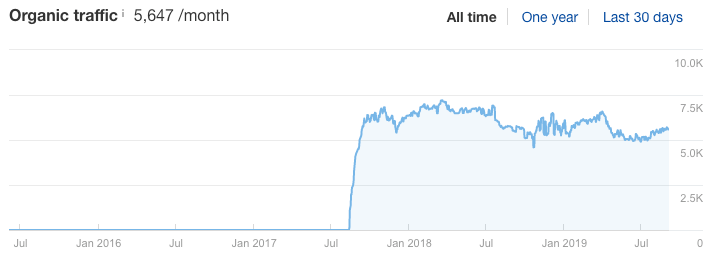
Not this:
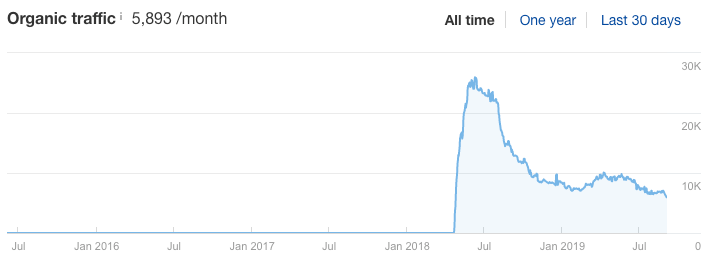
The reason it makes more sense to pay attention to traffic over keyword rankings is that many pages rank for thousands of keywords. And they often get traffic from many of these keywords—not just one.
Final thoughts
Knowing how search engines work and the attributes theyre looking for when ranking content is crucial when trying to create content that ranks.
That said, search engine algorithms change all the time and theres no guarantee that whats important today will still be important next year.
Dont let that panic you. Generally speaking, the important things stay consistent over time.
Factors like backlinks, “authority,†and matching search intent have been critical factors for many years—and theres no sign of that changing any time soon.
 Best resource for Online free Education
Best resource for Online free Education

